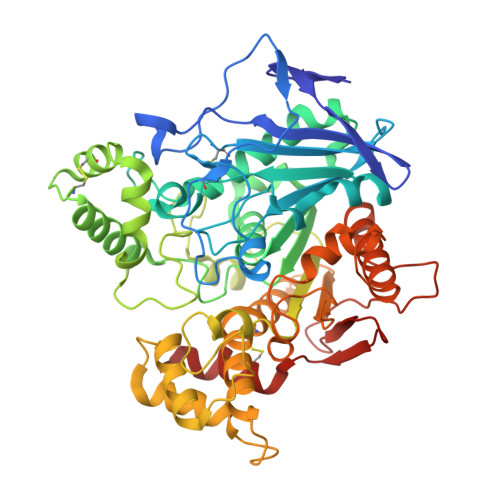Lead Optimization of a Butyrylcholinesterase Inhibitor for the Treatment of Alzheimer's Disease.
Kosak, U., Strasek Benedik, N., Knez, D., Zakelj, S., Trontelj, J., Pislar, A., Horvat, S., Bolje, A., Znidarsic, N., Grgurevic, N., Svara, T., Kljun, J., Skrzypczak-Wiercioch, A., Lv, B., Xiong, Y., Wang, Q., Bian, R., Shao, J., Dias, J., Nachon, F., Brazzolotto, X., Stojan, J., Sun, H., Salat, K., Gobec, S.(2025) J Med Chem 68: 11693-11723
- PubMed: 40454648
- DOI: https://doi.org/10.1021/acs.jmedchem.5c00577
- Primary Citation of Related Structures:
9I02, 9I03 - PubMed Abstract:
Butyrylcholinesterase (BChE) is a promising drug target for alleviating the symptoms of canine cognitive dysfunction (CCD) and Alzheimer's disease (AD). We have recently developed lead compound 2 , a racemic, nanomolar BChE inhibitor with procognitive effects in mice with scopolamine-induced AD-like symptoms and dogs suffering from CCD. To overcome its modest brain exposure, we developed compound ( R )-(-)-3 , a more potent BChE inhibitor with a 7-fold higher in vivo brain exposure. It has procognitive effects in mice with scopolamine-induced AD-like symptoms and, superior to compound 2 , also in mice with Aβ 1-42 -induced AD-like symptoms. Compound ( R )-(-)-3 produces no cholinergic adverse effects or motor deficits and has no acute toxic effects in mice. This makes sulfonamide ( R )-(-)-3 an optimized lead compound for alleviating the symptoms of AD.
- Faculty of Pharmacy, University of Ljubljana, Aškerčeva cesta 7, 1000 Ljubljana, Slovenia.
Organizational Affiliation:



























